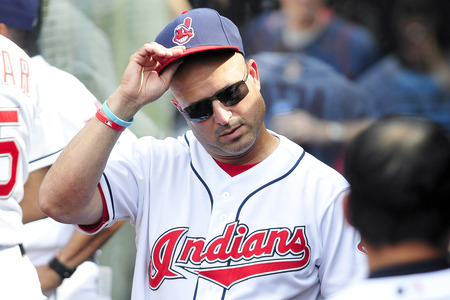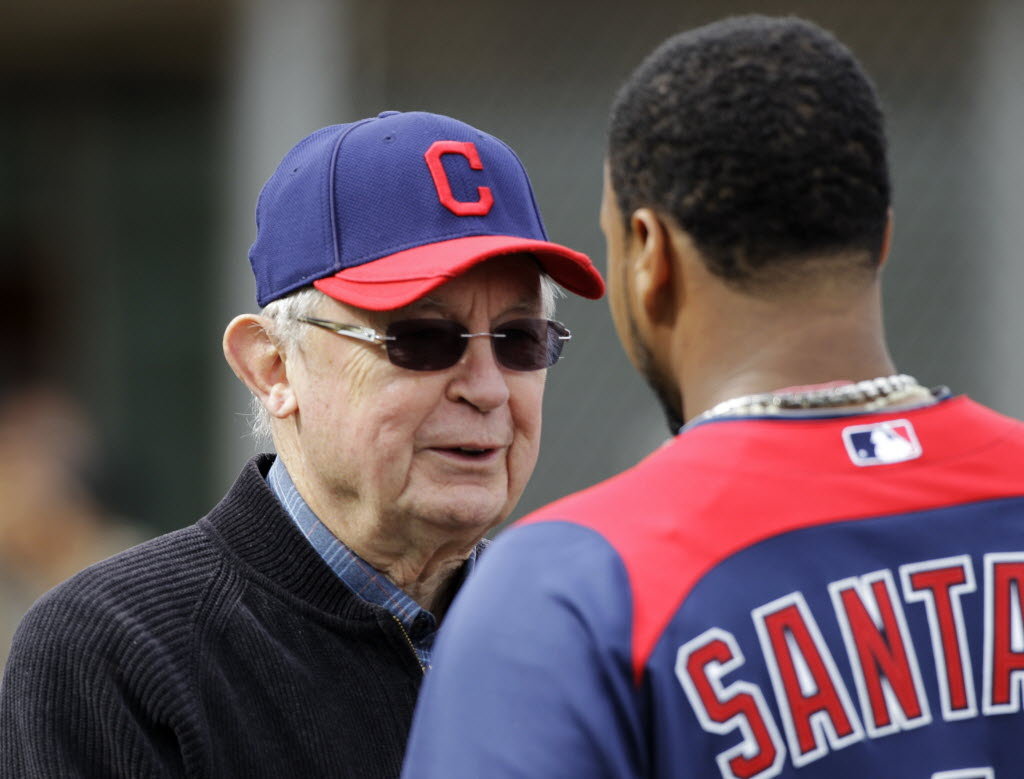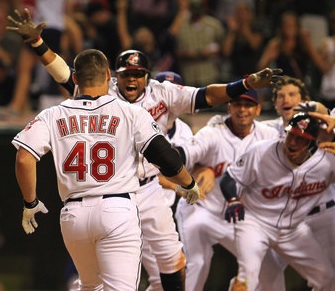 Indians Archive
Indians Archive  New Years Resolutions: Indians Edition
New Years Resolutions: Indians Edition
 We’ve reached that time of year where everybody starts to formulate a list of things they tell themselves they’re going to do in order to feel like January 1 is actually the start of something new. Really, I’ve found that the only thing the New Year does is force me to continuously scratch out the date I’ve written on forms because the previous year is written on it. Believe me, until at least March, I’ll still be writing /11 at the end of everything I have to date.
We’ve reached that time of year where everybody starts to formulate a list of things they tell themselves they’re going to do in order to feel like January 1 is actually the start of something new. Really, I’ve found that the only thing the New Year does is force me to continuously scratch out the date I’ve written on forms because the previous year is written on it. Believe me, until at least March, I’ll still be writing /11 at the end of everything I have to date.
Anyway, this year, instead of lying to myself about getting a membership for Bally’s, I determined that I’m going to make some baseball fan-related resolutions. Specifically, Indians-related resolutions. I suggest some of you take these to heart and even think about resolving to do them yourself.
My biggest resolution for the 2012 season is that I am going to give Manny Acta the benefit of the doubt. After managing losers in Washington, I was highly skeptical of Acta’s ability to lead a team with some talent and a chance at a winning record. Acta served as a brilliant ship captain last season, refusing to use injuries as an excuse for the team’s precipitous decline after May 23.
No matter the impression we all give off, we are nothing more than fans with varying levels of knowledge. While I feel like I am near the higher levels of said knowledge, I vow not to try to tell myself that I know the team better than the manager does. I found myself disagreeing with Acta’s management of the bullpen in certain spots, leaving starters in too long or giving at bats to guys who shouldn’t have them in key spots. Once the game ended, or looking at the bigger picture, the season, I would gather my thoughts and look back at the situation. Maybe Acta wanted to send the player a message. Maybe Acta wanted to see how the player would react under pressure. After all, the Indians were one of the youngest teams in baseball.
Basically, the overriding theme here is that Manny Acta earned my respect as a manager. He pushed all the right buttons for the first 45 games of the season and was the catalyst of the most exciting overachievement in recent Cleveland sports history. He has a tremendous mind for the game. He seems to be one of the more advanced managers when it comes to interpreting statistics and, most importantly, appears to have a lot of respect from his players. If they respect their manager, so should I. They know better than I do.
 My second biggest resolution is to defend the Dolans every opportunity I get. Many “fans” have pie in the sky ideas about how to construct the Indians roster using the auction-esque free agent system Major League Baseball currently has. These people need to be referred to in quotation marks because they are clueless. Being an Indians fan means that you have a strong understanding of what the team has to do in order to be competitive. Shelling out one-fifth of the payroll to an overpaid free agent signing is not the way to do it. It means finding good return on investment potential and going for it. Before you try to catch me in a trap referring my Josh Willingham piece from a couple weeks ago, consider the way I approached that column. Willingham wound up being $3M per season cheaper than Michael Cuddyer, Jason Kubel makes $500,000 less per season and Jayson Werth makes significantly more. Willingham, for the price, market conditions, and production was a good investment.
My second biggest resolution is to defend the Dolans every opportunity I get. Many “fans” have pie in the sky ideas about how to construct the Indians roster using the auction-esque free agent system Major League Baseball currently has. These people need to be referred to in quotation marks because they are clueless. Being an Indians fan means that you have a strong understanding of what the team has to do in order to be competitive. Shelling out one-fifth of the payroll to an overpaid free agent signing is not the way to do it. It means finding good return on investment potential and going for it. Before you try to catch me in a trap referring my Josh Willingham piece from a couple weeks ago, consider the way I approached that column. Willingham wound up being $3M per season cheaper than Michael Cuddyer, Jason Kubel makes $500,000 less per season and Jayson Werth makes significantly more. Willingham, for the price, market conditions, and production was a good investment.
In any event, if you recall the Forbes 2011 Team Valuations, the Indians are worth $353M. The Dolans purchased the team in 2000 for $323M. If you had a $323M investment and didn’t even garner a 10% profit over 11 years, it would have to severely limit your ability to spend large sums of money to enhance your investment. The “You have to spend money to make money” axiom is not always true. Given the economic recession, a shrinking population, and a lack of disposable income among the target demographic, it must be understandable to the fans why the Dolans are not able to be big players in free agency. The Dolans must operate under the pretense that spending money will not necessarily bring in more money. Instead, it may handicap them even more with what they can do and hamper the team’s payroll even more.
Quite frankly, the Indians have spent money almost as wisely as they could. The Indians saw value in signing Travis Hafner to a contract extension after he put up 103 HR and 334 RBI from 2004-2006. Injuries have derailed Hafner and his inability to play a position has made that extension look awful in hindsight. The Dolans certainly didn’t plan on Jake Westbrook and his 200 innings per year to go down the drain due to Tommy John surgery. Fangraphs’ estimated monetary value for Westbrook from 2004-2007 was $12.2M, $12.8M, $16.8M, $9.4M (year with oblique strain). His contract extension was for $11M per year. Again, had he kept a similar pace, a good return on investment.
How about recently? The Indians in the last couple of drafts have spent more money than ever before for scouting and signing bonuses. Working with financial constraints and dealing with MLB’s ridiculous free market bidding on free agents, the draft is the way to build, no? Draft a good player, control him for six guaranteed years, and try to sign an extension after that. For an ownership group who is very frugal about money, doesn’t their willingness to spend on the ultimate crapshoot in sports show you something about their financial dedication to the franchise? It does to me.
Furthermore, as much as I’m sure most of you want to willfully ignore, Larry Dolan is one of us. He was born in Cleveland Heights. He attended Saint Ignatius High School. He grew up an Indians fan. Sure, he re-privatized the Indians in 2000 when he bought the team and bought back publicly-owned stock, but it was part of his business plan. I would like to believe that he genuinely cares about his hometown team. I also like to believe I’m right.
 My third, and final, resolution is to remain patient with the Cleveland Indians. All of us in this city are frustrated beyond words with our sports teams. Sports are meant to serve as an escape from the realities we all have of no money in the checking account, bills in the mailbox daily and nagging loved ones. Instead, our teams have fed us a diet of pureed shit and sadness for as long as most of us can remember. No doubt we all want to see results from this seemingly never-ending rebuilding project. We have two years to show for the ten we have spent retooling and reimagining the rosters from the MLB level all the way down to Single-A.
My third, and final, resolution is to remain patient with the Cleveland Indians. All of us in this city are frustrated beyond words with our sports teams. Sports are meant to serve as an escape from the realities we all have of no money in the checking account, bills in the mailbox daily and nagging loved ones. Instead, our teams have fed us a diet of pureed shit and sadness for as long as most of us can remember. No doubt we all want to see results from this seemingly never-ending rebuilding project. We have two years to show for the ten we have spent retooling and reimagining the rosters from the MLB level all the way down to Single-A.
I don’t expect miracles. I don’t know if any of us in Cleveland believe that they exist in the sporting world. And, if they do, they certainly aren’t destined to wind up blessing the teams who call downtown Cleveland home. However, it truly is (don’t punch your monitor) a process. Prospects must develop together. Guys must simultaneously have career years. Lady luck needs to grace us with her presence. A lot of things need to go right to have a magical season. Even for the big market teams, they must stay healthy and have all of their multi-million dollar players perform at the level they’re being paid to perform at.
It takes patience to be a Cleveland Indians fan. It takes perspective. It takes the understanding of the business of baseball. It takes realizing what the team can control and what it cannot. Being pissed off, chastising the franchise, and vowing to never spend another dollar on the team doesn’t do anybody any good. All it does is show selfishness. You may be annoyed to the point of apathy, but what about your next door neighbor who has a partial season ticket package? What about your second cousin who watches every game religiously? How about the 74-year-old woman fighting her second bout of breast cancer who just wants to see a World Series she can remember us winning before she dies?
We all have to be in this together. The sum of all parts and all of that. It’s inexplicable to complain about the Dolans not spending money after you have vowed not to spend any of your own on the team. I highly doubt that they own a golden goose or that those trees in Heritage Park actually grow money on their branches.
It was approximately two weeks after the World Series that I began asking if it was baseball season yet. All of us, fans and players, needed some time to decompress. To reflect on what might have been had the Indians stayed healthy or had some more experience to push them through the trying parts of the season. Snow is flying around outside, probably mixed with rain and sleet, yet I am periodically breaking from writing this column to watch highlights from the 2011 season. I’m even going back to 2007 just to bring those memories back to the forefront of my mind and pass the time through the offseason.
More than anything else, I’m excited for what 2012 will bring for the Cleveland Indians. From the ownership down to the clubhouse manager, there is a commitment to this team and the players who will take the field. This New Year’s, I resolve to stay true to my commitment to this team.
- NBA Announces 2013-2014 Schedule
- Browns Ink Sharknado
- Sharknado A No-Show For Rookie Camp
- Trent Richardson Out Until Training Camp
- Browns Sign Brandon Jackson
- Carrasco Suspended Eight Games
- Browns Add to Wide Receiver Depth with David Nelson
- Browns Need to Learn from Past Draft Mistakes
- Browns Release Chris Gocong and Usama Young
- Browns Missing on Grimes Disappointing, But Not The End
The TCF Forums
- Chris Grant's first 3 drafts
Kingpin74 (Tuesday, January 21 2014 10:13 AM) - The 2014 Offseason Thread
googleeph2 (Tuesday, January 21 2014 9:36 AM) - 2015 Recruiting
furls (Tuesday, January 21 2014 6:57 AM) - Mike Brown
YahooFanChicago (Monday, January 20 2014 11:15 PM) - Movies coming out
HoodooMan (Monday, January 20 2014 9:34 PM) - 2014 Hoops Hockey Hijinx
jpd1224 (Monday, January 20 2014 4:44 PM) - 2014 Recruiting
jclvd_23 (Monday, January 20 2014 2:26 PM) - Wish List - #4 Pick
Hikohadon (Monday, January 20 2014 1:26 PM) - Official- Browns Coach Search/Rumors
OldDawg (Sunday, January 19 2014 6:48 PM) - #1 overall pick Anthony Bennett
TouchEmAllTime (Sunday, January 19 2014 1:28 PM)


